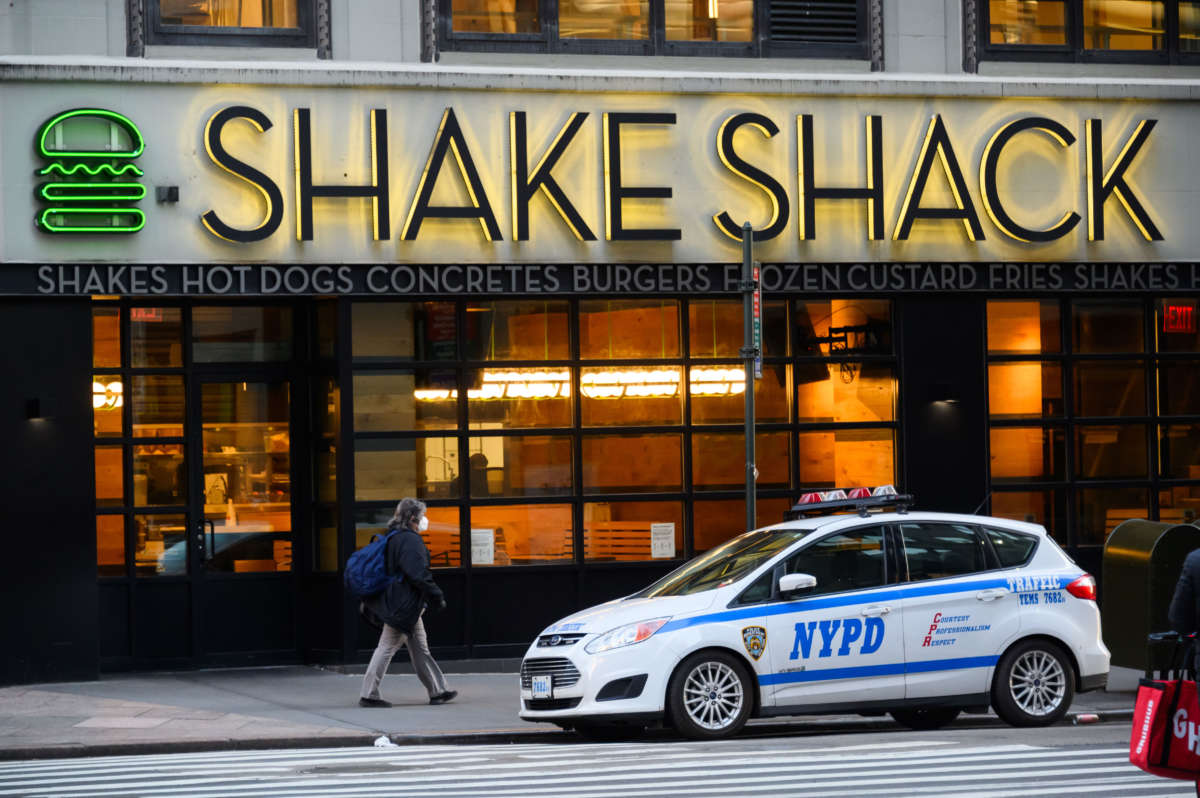After three police officers in New York City had consumed milkshakes that made them ill, police unions in the city alleged the incident was a purposeful “attack” on cops. But an investigation of the matter later found that it was accidental, not criminal.
Three officers on protest detail in New York City had visited a Shake Shack location and purchased milkshakes, later becoming sick and requiring visits to the hospital. The officers were released shortly after, but the Police Benevolent Association of the City of New York (NYC PBA), the largest union of police officers in New York, slammed the company for purportedly hurting the officers on purpose.
“When NYC police officers cannot even take [a] meal without coming under attack, it is clear that environment in which we work has deteriorated to a critical level,” NYC PBA said in a tweet on the matter. “We cannot afford to let our guard down for even a moment.”
Another New York police union, the Detectives’ Endowment Association, released a similar statement, claiming the officers were “intentionally poisoned” after initial reports of the incident came out.
Neither police union had evidence to back up their claims. Indeed, after NYPD conducted an investigation into the milkshake incident, it was determined on Tuesday morning that no criminal action had taken place. Instead, it appeared that a cleaning solution for the milkshake machine hadn’t been properly cleared out before the milkshakes began being served.
Both police unions have since issued retractions of their initial remarks, with NYC PBA recognizing that “no criminality” was evident. However, it appeared as though the backlash against Shake Shack had already begun, regardless of those retractions, due to the initial outrage over accusations levied onto the company.
Although Shake Shack — a $450 million corporation that was recently embroiled in a controversy over its acquisition of PPP loans — announced on Monday evening, before the investigation was concluded, that it was cooperating with police and “horrified” by the events, several users on social media accused the business of “attempted murder” and targeting of police in general. A #BoycottShakeShack hashtag was also created in response to the allegations by the police unions.
Even after news came out that it was an honest mistake, some users refused to believe it, continuing their crusade against the company even after the findings of the investigation were made public.
The initial statements from police unions in New York City over the accidental contamination of milkshakes are indicative of a regular practice by police officers across the country to perpetually play the role of victim. As Max Felker-Kantor, assistant professor of history and African American studies at Ball State University, pointed out in a Truthout article last week, most calls to reform or change the way police protection works are met with fierce opposition, often coupled with baseless attacks from the police toward critics or the community at large.
The police response to recent calls to defund police departments have been no different.
“Defunding the police is a critical step, but it will not be enough without recognizing how the police will use demands for systemic reform to frame themselves as the ‘victims’ in need of more support and power to maintain so-called law and order,” Felker-Kantor wrote.
Trump is silencing political dissent. We appeal for your support.
Progressive nonprofits are the latest target caught in Trump’s crosshairs. With the aim of eliminating political opposition, Trump and his sycophants are working to curb government funding, constrain private foundations, and even cut tax-exempt status from organizations he dislikes.
We’re concerned, because Truthout is not immune to such bad-faith attacks.
We can only resist Trump’s attacks by cultivating a strong base of support. The right-wing mediasphere is funded comfortably by billionaire owners and venture capitalist philanthropists. At Truthout, we have you.
Our fundraising campaign is over, but we fell a bit short and still need your help. Please take a meaningful action in the fight against authoritarianism: make a one-time or monthly donation to Truthout. If you have the means, please dig deep.
